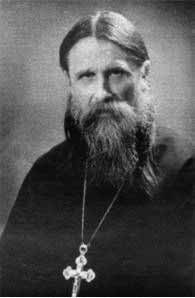29 Oct 09: Homily on the 20th Sunday after Pentecost
20th Sunday after Pentecost – Resurrection of the Son of the Widow
Homily From “The One Thing Needful,” Sermons of Archbishop Andrei (Rymarenko)
 Christ, surrounded by His Apostles and a multitude of people, moved toward the gates of the town of Nain. And at that time, from the town of Nain appeared a funeral procession. A young man was being carried out, the only son of a widow from Nain. Imagine the suffering of the mother: the only one, the favorite, the hope of her old age.
Christ, surrounded by His Apostles and a multitude of people, moved toward the gates of the town of Nain. And at that time, from the town of Nain appeared a funeral procession. A young man was being carried out, the only son of a widow from Nain. Imagine the suffering of the mother: the only one, the favorite, the hope of her old age.
What was the mother going through? But at this time, Christ, with a multitude of people and His Apostles, approached this procession on the road. He came closer and closer. He was walking on the same road on which the deceased was being carried. He saw the suffering of the mother, came up to her and said, “Weep not” (Lk. 7:13). Who could, who had the right to say these words to a mother at the coffin of her son? He alone, because He conquered death. The bearers stopped. Christ took the young man by the hand and said: “Arise!” (Lk. 7:14). And He returned him to his mother.
Can you imagine what the mother was experiencing? The peace which a mother could have before the death of her son, that peace was not only renewed, but it revived her whole life. Besides her son, she saw the power of resurrection. And all this happened because the way of Christ coincided with the way of the funeral procession. The way of Christ — the deceased had to move along this way of Christ, and on the way of Christ there can be no grief. This is how it happened. In saying “Weep not,” Christ renewed the inner strength which had already been put to rest. Years might pass, and this young man would depart in the same way. But this is not the point. The point is that peace appeared in the heart, strengthening the person in external existence.
Maybe I am mistaken. Maybe my way of thinking is wrong. All right, then open to the Apostle’s reading for today, and you will see that I am telling the truth. What does today’s reading from the Apostle say? It tells us about the Apostle Paul, while he was still Saul. Here is what it says: A new gospel I am giving to you; “the gospel which was preached of me is not after man….but by the revelation of Jesus Christ” (Gal. 1:11-12). How was this revealed? It was revealed in this way: Paul (Saul) was a true Pharisee and he awaited the Messiah. But what kind of Messiah were the Jews expecting at that time? The Jews were under the domination of Rome, and a certain balance had been established between Rome and the Jewish lawmakers and princes. And the Jewish nation was waiting for the coming of the Messiah; and they thought of the Messiah as a king who should free them from the power of Rome and make them head of the world — king. The Pharisee Saul thought in the same way. He believed it would be thus: that the Jewish Messiah would come and would give them, the Jews, worldwide dominion. And everything he did, he did sincerely. He sincerely awaited the Messiah, and because he awaited the Messiah with such sincerity, and did not know or understand that Christ was the Messiah; at the moment he was going to persecute what seemed to him a sect of Nazarenes, at that moment Christ appeared to him, because he was seeking the Christ. And here, in a moment, Saul changed into Paul a Christian. The Gospel was revealed to him. And here it is again: the way of the Messiah. On this way of the Messiah stood Paul. And because of this sincere motion toward salvation, the Truth was revealed to him.
So it is for us, brothers. We too should know what way we are standing on. The way of a Christian is the element in which the Way of Christ is revealed. And the Way of Christ is the Church. In her is the Grace which exists in all the sacraments, in all activities of the Church, in all the prayers, in everything which is given to us for sanctification. And this Grace which is in the Church is with us. It is expressed in every activity, in the rites, and in a special way, in the Divine Eucharist, in this Tree of Life which is given to us for the renewal of our nature, for our deification.
Here is the way on which we must go. If we are on this way, then, believe me, there will not be such tragedy in our life as there is now. If the Lord said to the widow of Nain: “Weep not!” so that same voice whispers to us today, “Weep not!” Only do not abandon this way of true Christianity. Abide in prayer, behave yourself in life as the Holy Church requires, remembering the Father, the Son, and the Holy Spirit, the mystery of death and the mystery of life. See how life goes on: Monday, Tuesday, Wednesday, Thursday, Friday, Saturday — Sunday [the day of Resurrection] (The word for Sunday in Russian (voskresenia) means resurrection). The end of everything is the Resurrection.
Live in the Grace of God, and the Lord will not forsake you.

 Sts Cyril and Methodius Orthodox Institute
Sts Cyril and Methodius Orthodox Institute